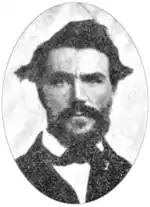Ralph Wilcox
Ralph Wilcox (July 9, 1818 – April 18, 1877) was the first teacher and practicing doctor in Portland, Oregon.[1] He also served in the Provisional Government of Oregon, was a legislator during both the territorial period and when Oregon became a state, and a judge of Twality County during the provisional government. He killed himself at work at the United States District Court for the District of Oregon in Portland.
Ralph Wilcox | |
|---|---|
 | |
| Speaker of the Provisional Legislature of Oregon | |
| In office December 13, 1848 – February 5, 1849 | |
| Preceded by | Robert Newell |
| Succeeded by | Levi A. Rice |
| Member of the Provisional Legislature of Oregon | |
| In office December 7, 1847 – February 16, 1849 | |
| Succeeded by | Provisional Government dissolved |
| Constituency | Tuality District |
| Speaker of the Oregon Territory House of Representatives | |
| In office December 2, 1850 – February 8, 1851 | |
| Preceded by | Asa Lovejoy |
| Succeeded by | William M. King |
| Member of the Oregon Territory House of Representatives | |
| In office December 2, 1850 – January 21, 1852 | |
| Preceded by | David Hill |
| Succeeded by | Seat split into three |
| Constituency | Washington County |
| Oregon Territory Council | |
| In office 1853–1854 | |
| Constituency | Washington County |
| Personal details | |
| Born | July 9, 1818 East Bloomfield, New York |
| Died | April 18, 1877 (aged 58) Portland, Oregon |
| Spouse | Julia Ann Fickel |
| Occupation | physician |
Early life
A native of New York, Wilcox was born in East Bloomfield, New York, to Arminta Lee Wilcox and Ralph Wilcox Sr. on July 9, 1818.[1] In New York the younger Ralph graduated from Geneva Medical College in 1839.[1] He then moved to Missouri where he practiced medicine.[2] Then in 1840 Ralph married Julia Ann Fickel, and the couple would have five children.[1] In 1845 the family traveled the Oregon Trail to Oregon Country and took the ill-fated Meek Cutoff.[1]
Oregon
After arriving in Oregon, Wilcox took a job teaching in Portland, Oregon, in 1847 and became the first teacher in that city.[1][3][4] Later that year George Abernethy, the governor of the Provisional Government, appointed Wilcox as a county judge for Twality (now Washington) County.[1] Also that year he was elected to the Provisional Legislature.[5] The next year he was elected again and served in the final sessions of the provisional government in 1848 and 1849, including time as the speaker of the assembly.[6]
In 1850 after Oregon had become a United States territory, Wilcox was elected to the Oregon House of Representatives of the Territorial Legislature, replacing David Hill and served as speaker of the body.[7] The following year he returned representing what had become Washington County, but was not selected as speaker.[8] In 1853 he returned to the legislature serving as president of the upper chamber Council.[9]
From 1856 until 1858 Ralph Wilcox served as a registrar for the U. S. Land Office in Oregon City, and then as county judge in Washington County from 1858 to 1862.[1] Wilcox was also elected Oregon City mayor during this time.[4] In 1862 he returned to state politics and was elected as a representative to the Oregon House of Representatives as a Republican from Washington County.[10] Also, from 1862 to 1863 he was the school superintendent for Washington County.[11] During the American Civil War he was surgeon-general for Oregon’s militia, but no Oregon companies saw action in the war due to the distance to the fronts.[3] Then from 1865 to 1877 he was a clerk for the United States District Court for the District of Oregon in Portland.[1]
Death
Ralph Wilcox died on April 18, 1877, at the age of 58.[1] He killed himself after heavy drinking.[12] He shot himself in the head with a Deringer pistol in his office of the federal court with Judge L. Sawyer being the first to discover the act after hearing the shot.[12] Wilcox killed himself in the afternoon just before court was to resume with Matthew Deady and Sawyer.[12] He left behind a wife, and a suicide note blaming drinking for the suicide.[12] Wilcox was buried at Lone Fir Cemetery in East Portland.[1]
See also
- James C. Hawthorne, another early doctor in Portland.
References
- Corning, Howard M. Dictionary of Oregon History. Binfords & Mort Publishing, 1956.
- Lang, H. O., ed. The History of the Willamette Valley, Being A Description of the Valley and its Resources, with an account of its Discovery and Settlement by White Men, and its Subsequent History; Together with Personal Reminiscences of its Early Pioneers. Portland, OR, Geo. H. Himes, Book and Job Printer, 1885. p. 650. Retrieved on January 28, 2008.
- Carey, Charles Henry. History of Oregon. The Pioneer Historical Publishing Company, 1922.
- Gaston, Joseph (1911). Portland, Oregon: Its History and Builders. Chicago: S.J. Clarke Publishing Co. p. 594.
- Oregon Legislative Assembly 1845-1849 Sessions, (3rd Provisional) 1847 Regular Session. Oregon State Archives. Retrieved on January 28, 2008.
- Oregon Legislative Assembly 1845-1849 Sessions, (4th Provisional) 1848-1849 Regular Session. Oregon State Archives. Retrieved on January 28, 2008.
- Oregon Legislative Assembly (2nd Territorial) 1850 Regular Session. Oregon State Archives. Retrieved on January 28, 2008.
- Oregon Legislative Assembly (3rd Territorial) 1851 Regular Session. Oregon State Archives. Retrieved on January 28, 2008.
- Oregon Legislative Assembly (5th Territorial) 1853 Regular Session. Oregon State Archives. Retrieved on January 28, 2008.
- Oregon Legislative Assembly (2nd) 1862 Regular Session. Oregon State Archives. Retrieved on January 28, 2008.
- Washington County officials. The Hillsboro Argus, October 19, 1976.
- "Shocking suicide". Stockton Daily Independent. April 21, 1877. Retrieved 2016-07-16.